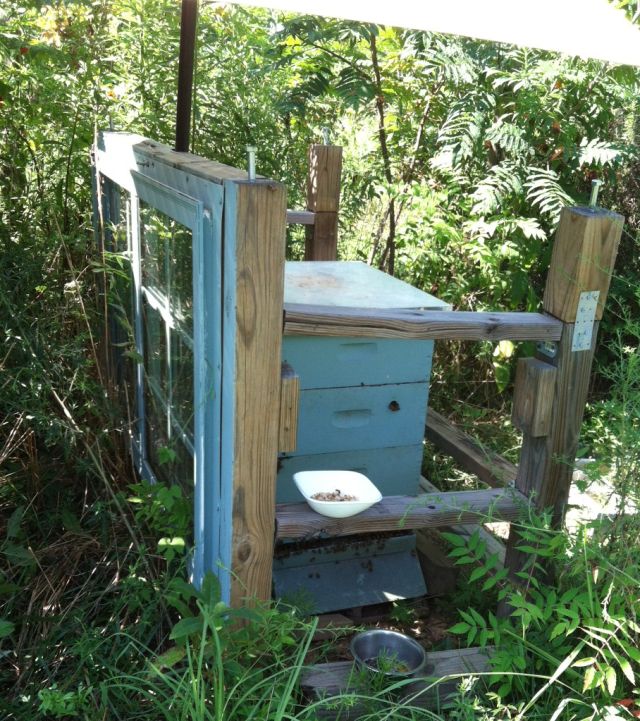Yesterday, Sunday, I had my best honey harvest in the two years I have been collecting honey from my bees. I filled just over 32 pint jars, which equals 4 gallons. Earlier this year (4/29 and 6/3) I collected 1.2 and 1.4 gallons of honey, so total yield is 6.6 gallons. If I assume an average weight of 12 lbs per gallon, this is about 80 lbs of honey, which is good going for me. But my activities were tinged with regrets. I made some mistakes and regret them.
I have two hives. The one I started this year with members from the main hive is doing ok but not great and, after a quick inspection, I decided it did not have honey to contribute. So I focused on my main hive which I have had for 2 plus years. It has 3 hive bodies or boxes on top of each other. The bottom is a deep (9.625″ high) and the two above it are medium supers (6.625″ high). I had placed the super I harvested in June and April in the middle and so the super on top had not been harvested this year. I inspected the first frame in the top super (there are 10 frames in a box) and saw it was filled with honey. So I concluded all the other frames in the top super were also filled with honey (my first mistake – I should have examined the individual frames).

I don’t use chemicals on my bees with one exception – I use butyric acid, which is vile smelling, to make the bees leave the hive body. I am now reconsidering this practice. Anyhow, I applied the butyric acid to the fume board, which is a lid you place above the hive body you wish to harvest, and the bees all departed the hive body or so I thought. Then I transported the hive body to the kitchen where the harvesting and extraction equipment awaited.
Before moving the hives into the kitchen I inspected them outside and found a lot of bees still on the middle frames. I looked to see if they included the queen, did not see her and with a bee brush I gently brushed them off the frames. To my surprise they held on tenaciously and it took several attempts to get them all off. Then I moved the frames into the kitchen.
I thought all 10 frames would contain honey and the first 3 did. But, to my upset, the next 4 contained larva. In other words, the queen and her retinue had moved up from the deep and she had laid eggs in the top super. I harvested honey from the 3 frames at the other end and then returned the 10 frames (6 empty and 4 with brood) to the hive. It had not occurred to me that the queen could have moved to the top super. The bee club I belong to encourages the use of a queen excluder (a metal grill which prevents the queen moving up) but I chose not to use it.
When I returned the top super I carefully went through the frames in the deep and middle super and selected 6 frames laden with honey which I harvested, without mishaps.
I was upset for several reasons. The bees which clung to the frames were nurse bees not foragers. Nurse bees are young bees which have not yet been outside the hive. Therefore they have not performed their orientation flights, which means that the bees I had buzzing outside the kitchen did not know where they were or how to return to the hive. I could tell they were nurse bees because when they landed close I could see from their size, fuzziness and gentle color they were young bees. I tried to make amends by placing pieces of wax cuttings containing honey on plates outside the kitchen and when the offerings were covered with bees I covered the plates and moved the assembly to the hive entrance and hopefully some found their way back. But at the end of the day there were still a lot of bees buzzing around, some of which were the forever lost nurse bees. I think when I placed the wax scraps outside, word was quickly transmitted to the hives and a lot of the bees which were flying around were seasoned foragers bent on opportunistic honey treasure.
My second concern and a bigger concern was that somewhere amongst my missteps I may have lost or done in the queen. I hope not. My third concern is the larva (my future bees) could have been damaged from the exposure to the butyric acid. I now read that in Europe there are concerns about the use of butyric acid and next year I shall probably not use it. I could develop more concerns such as whether, with nurse bees absent, the functions of the hive will continue normally, but I will stop.
So a very good honey harvest, with a number of honey frames left unharvested for the bees use, but some regrets.
